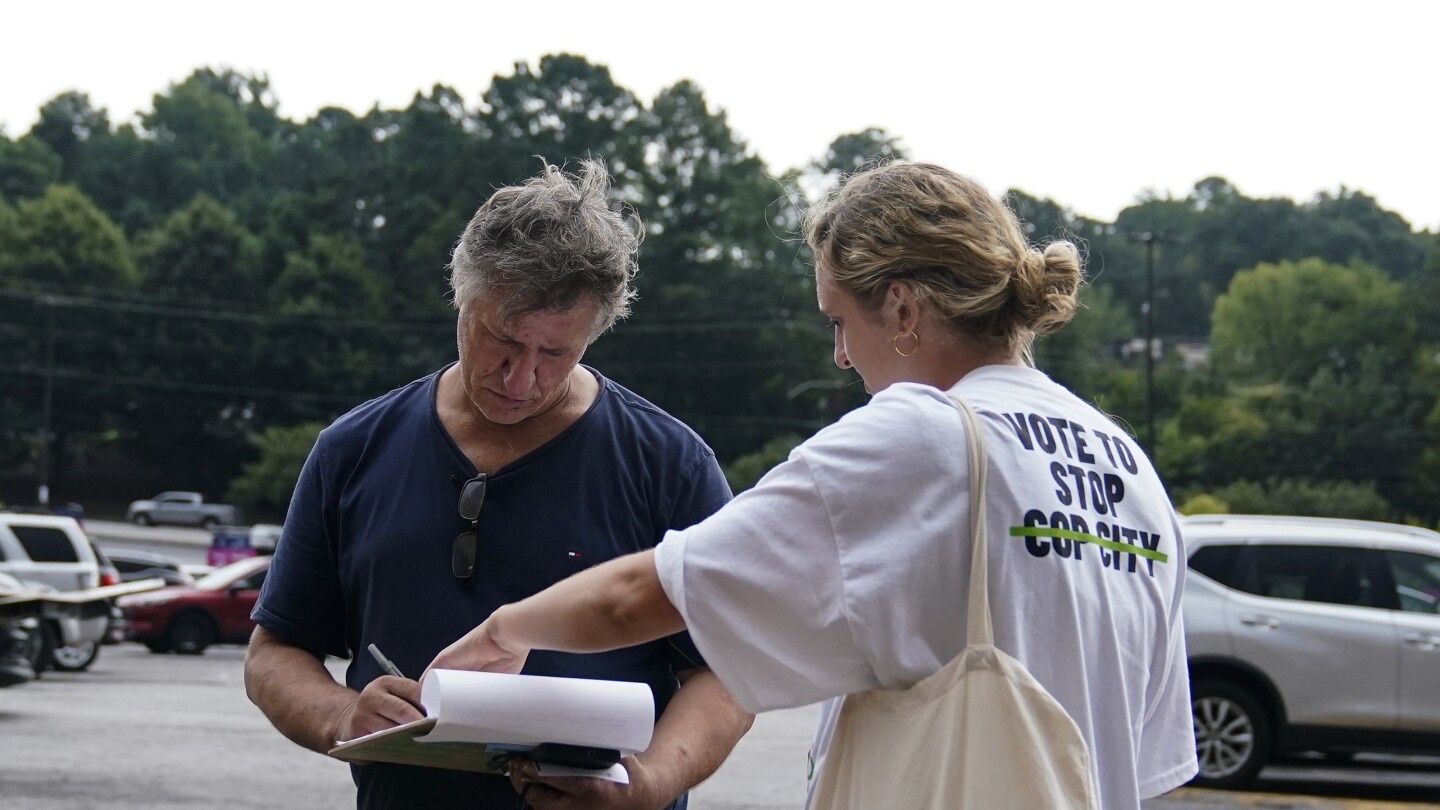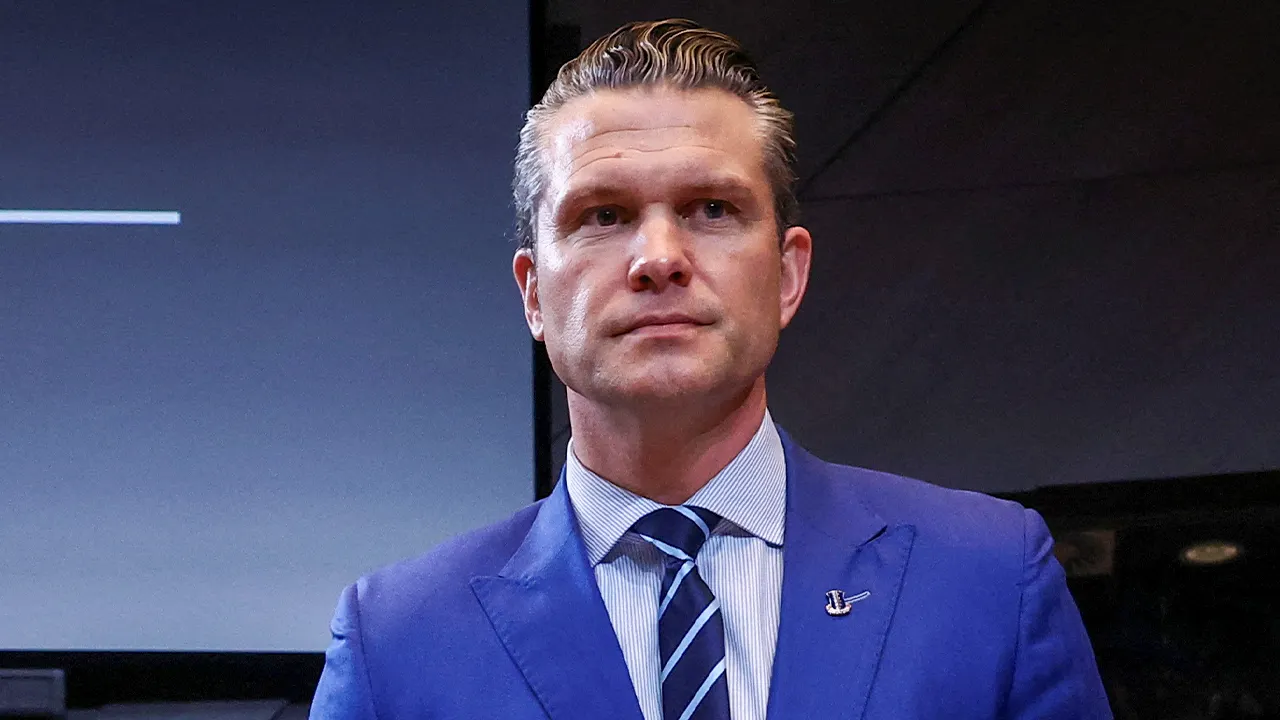Atlanta, GA
Activists furious Democratic leaders haven’t denounced plan to check every ‘Stop Cop City’ signature

ATLANTA (AP) — Georgia activists against a proposed police and firefighting training center have called on Democratic senators to denounce Atlanta’s plan to check every signature on a petition to put the issue to voters.
A “line-by-line review” would ensure the signatures match what officials have on file, said officials in the Democratic-led city, drawing praise from the head of the Georgia Republican Party, condemnation from voting rights groups, but silence from the state’s Democratic senators, who for years have railed against GOP-imposed voter restrictions.
That silence has enraged “Stop Cop City” activists, who say they’ve collected more than 100,000 signatures. They warned Georgia’s Democratic Party that it is turning its back on some of its most engaged members — people who knocked on doors to help Joe Biden narrowly win the battleground state in 2020 and will be asked to do the same thing next year.
“It’s just been crickets,” said Amelia Weltner, a 34-year-old DeKalb County resident who has organized, canvassed and worked as a staffer for Democrats. “Since it’s not Republicans doing the suppression, I guess it’s not as high of a concern?”
This summer, Weltner said she has collected about 75 signatures, even canvassing outside a Beyoncé concert to put a halt to the $90 million, 85-acre project that has become a national rallying cry for environmentalists and anti-police protesters. But Weltner doubts she’ll be motivated to canvass for Democrats who stood silent on an issue that’s so important to her.
“The biggest question I’m going to be asking is, ‘When we needed them. Where were they?’” Weltner said. “DeKalb County and Fulton County are Georgia’s blue wall — they need our votes.”
A spokesperson for Sen. Jon Ossoff declined to comment and Sen. Raphael Warnock’s office didn’t respond to a request for comment.
U.S. Rep. Nikema Williams, state Democratic Party chair, called for a “transparent process” in a Thursday statement three days after the city revealed its signature plan. She also denounced a type of signature matching that city officials have said they will not use.
Mayor Andre Dickens has no involvement in how the city councilmembers and the clerk’s office determine the forms should be examined, a spokesperson for the mayor said.
Tossing a petition based upon an inconsistent signature is a “widely discredited tool of voter suppression,” voting advocates say.
“That the city of Atlanta would use such a subjective and unreliable process is shameful and undermines the integrity of the city’s validation procedure,” more than two dozen voting rights organizations, including Fair Fight, wrote to city officials.
Opponents fear that the training center will lead to greater militarization of the police and exacerbate environmental damage in the South River Forest in a poor, predominantly Black area.
Officials counter that the campus would replace outdated, far-flung facilities and boost police morale, which is beset by hiring and retention struggles.
Organizers have until Sept. 23 to turn in about 58,000 valid signatures — the equivalent of 15% of registered voters as of the last city election. They are working to gather more to leave no doubt that voters want to decide.
Councilmembers have approved $67 million for the training center, despite huge protests inside City Hall. The referendum would seek to cancel the Council-endorsed lease agreement for the project.
But even if the referendum is approved by the clerk’s office and survives an ongoing legal challenge, a lengthy review process will likely mean it won’t appear on a ballot until March.
City officials say that once the signatures are turned in, at least two reviewers will examine questionable signatures. People whose signatures can’t be verified will be mailed a notice and called so they can prove they signed, officials said.
State Republican Party Chairman Josh McKoon said on social media, “Kudos to Mayor Dickens and the Atlanta City Council for insisting on a fair elections process by using robust Voter ID measures!”
But Democratic state Rep. Saira Draper, whose district includes the proposed site, took to social media this week to denounce the signature-matching plan, saying, “Atlanta, the cradle of the civil rights moment, must hold itself to a higher standard when it comes to voting rights.” Draper has declined to publicly take a position on the project itself.
Voters’ official signatures are often carelessly scrawled with a stylus on a digital tablet while getting a driver’s license, Draper said. When she worked in voter protection with state Democrats, “signature match was always something that we disagreed with and we fought against,” Draper told The Associated Press.
It’s doubtful a significant number of signatures were forged because they would be easily traced by personal information given on each form, Draper said.
On the lack of outcry from Warnock and Ossoff, Draper said she understood the activists’ frustration as well as “the position that being a federally elected official in a very purple state puts you in.”

Atlanta, GA
Keith Law predicts Braves will win 2025 World Series

Folks, Opening Day is tomorrow.
To. Morr. Ow.
As such, we’re starting to get predictions flooding in from everybody who’s bold enough to try to call how arguably the most unpredictable sport in North America is going to shake out from now all the way until October. The staff here at Battery Power will share our predictions with y’all later on and if you haven’t voted in our survey asking where you think the Braves will finish in the NL East this season, you’ve still got a chance for the time being.
Everybody’s dropping their two cents in the can and that includes Keith Law of The Athletic. His season preview is a massively comprehensive piece and I highly suggest that y’all subscribe and go check it out, since he’s been doing great work for a long time now and he’s continuing to do so with articles like this. As such, Law is feeling very bullish about the Atlanta Braves’ chances of winning the World Series for the first time since 2021 — to the point where he’s predicting that they’ll be the ones lifting the “piece of metal” once the season comes to its conclusion in October.
Here are his thoughts on the Braves heading into 2025:
Atlanta didn’t make any huge moves this winter, but they’ll get Spencer Strider and Ronald Acuña Jr., back early this season, and that may be all they needed to do. Sean Murphy’s injury opens the door for their top prospect Drake Baldwin to get some big-league time, and I wouldn’t be surprised if he acquits himself well enough to make demoting him a tough decision. Jurickson Profar probably won’t repeat his huge 2024 season, but he could give half of that value back and still be an upgrade for them in left.
He goes on to predict later on in the article that the Braves will end up toppling the Red Sox in the World Series. Needless to say, that’s a result that would make everybody in Braves Country and this corner of the internet in particular very happy. Of course, it’s much easier said than done — especially in a sport such as baseball where the long marathon to the Postseason often can turn into a face plant during the sprint to the World Series.
Still, there’s plenty of reason to feel optimistic about the Braves as they head into the 2025 season. Everybody’s 0-0 to start the season but it’s clear that the Braves have very good reason to feel like this could be their year once again. As usual, we’ll see what happens!
Atlanta, GA
Atlanta Fine Homes Sotheby’s International Realty ranked Metro Atlanta’s No. 1 Brokerage

Atlanta Fine Homes Sotheby’s International Realty proudly ranked as Metro Atlanta’s No. 1 brokerage for the fifth consecutive year. In 2024, our advisors sold a remarkable $4.3 billion in total sales, a testament to our unwavering commitment to our clients and the communities we serve.
At Atlanta Fine Homes Sotheby’s International Realty, we exist to help you live the life you dream of. Our clients benefit from our global presence, dynamic marketing strategies, and unparalleled professional service. Through our commitment to exceptional service and results, we proudly ranked No. 1 in total sales across the six-county Metro Atlanta area, including the areas of Buckhead, Intown, Sandy Springs, Brookhaven, North Fulton, and South Forsyth.
REPRESENTING ALL PRICE POINTS.
In addition to record-setting sales, 45% of our transactions in 2024 were under $650,000, showcasing that luxury isn’t a price point, but a level of service shaped by the insight our advisors provide.
“Each of my clients gets the same level of attention because, to each one, it is their most important transaction. The stories are all unique,” says Betsy Akers, No. 5 advisor with the Atlanta REALTORS® Association, who sold properties ranging from a $35 million luxury estate to a $550,000 listing in 2024.
Her client-first philosophy perfectly reflects our mission: build lifelong relationships by treating every client like family.
EXTRAORDINARY REPRESENTATION.
A snapshot of our 2024 highlights:
Chase Mizell, the No. 2 advisor for volume sold with the Atlanta REALTORS Association, launched Entelechy II, a $40 million masterpiece in Sea Island, Georgia designed by the late John Portman, the iconic Atlanta-based architect renowned for transforming skylines.
“It’s estates like this that remind me why I do what I do — connecting extraordinary properties with discerning buyers who appreciate the artistry behind them.”

Bayne Battleson Group, led by Sam Bayne and Ashley Battleson, earned the No. 3 spot for team volume with the Atlanta REALTORS® Association. Sam brought the buyer for Georgia’s largest publicly listed sale of the year—a $35 million estate. Despite starting at a lower price point, their client was captivated by the 50,000± square foot property. After weeks of negotiations, the seller finally accepted.

Kevin McBride and Jessica Sheevy earned the No. 3 and No. 4 spots for volume sold with the Atlanta REALTORS® Association, driven by their success with The Dillon in Buckhead. The 2.5-year project redefined luxury condominium living, with 95 units sold in just a year, bringing the building to near sell-out status as only four units remain. Their strategic use of live video content documenting the entire process was a game-changer, reaching a 6,000-person prospect and homeowner list and making a powerful impact.

The Boyd Team, led by Kim Boyd and Kathryn Boyd Crabtree, earned the No. 2 spot for homes sold and No. 5 for volume sold with the Atlanta REALTORS® Association. One of their standout transactions was a heartwarming homecoming in Collier Hills, where they reunited former owners with their beloved home—representing both sides in a rare, “Father of the Bride”-style twist.

Bonnie Majher, who earned the No. 6 spot for volume sold with the Atlanta REALTORS® Association, made a lasting impact by helping a client sell their home just in time to be by her husband’s side in his final moments — a powerful reminder that real estate is about far more than closing deals.
REMEMBERING OUR FOUNDER, JENNY PRUITT.
In 2024, we lost our beloved Founder and CEO, Jenny Pruitt. Jenny’s remarkable legacy continues to inspire us. She made immeasurable contributions to the real estate industry, the advancement of women, and our community. She was a genuine servant leader, guided by her incredible faith.
“If you find your purpose in life, you will discover your passion! When you are doing something that you are passionate about, you will be fulfilled. I feel like I never worked a day in my life because I love what I do.”

YOUR COMMUNITY IS OUR COMMUNITY.
Jenny’s dedication to giving back lives on through our commitment to over 30 arts, charitable, and educational organizations across Georgia and beyond. From donations and sponsorships to volunteering, mentoring, and board leadership, we remain passionate about strengthening the communities where we live and work.

GLOBAL REACH. LOCAL IMPACT.
In 2024, Sotheby’s International Realty® expanded its global presence, opening 37 new offices worldwide, bringing its total to over 1,100 offices in 84 countries and territories with more than 26,100 advisors. The brand achieved $157 billion in 2024 sales volume, demonstrating the power of its international reach, referral network, and unrivaled brand recognition.
Click to view properties exclusively represented by Atlanta Fine Homes Sotheby’s International Realty.
Every home is unique. Every client is one of a kind.
Source:
TrendGraphix, Top 5 Firms, January 2025. January 1 – December 31, 2024. Cherokee, Cobb, DeKalb, Forsyth, Fulton and Gwinnett Counties. All Property Types; All Price Points.
Atlanta, GA
Atlanta Hawks vs Houston Rockets: Spread & Over/Under Predictions For Tonight’s Game

The Atlanta Hawks have won three in a row and seven of their last ten games coming into tonight’s matchup with the Houston Rockets. This game is going to be an interesting matchup between one of the league’s hottest offenses vs one of the league’s best defenses. Houston won a close matchup in Atlanta earlier this season and another close game could be on the way.
Our own Rohan Raman gave an in-depth preview for tonight’s game:
“Coming into tonight’s game, the Hawks are 5th in the NBA in PPG, 14th in FG%, 16th in 3PA, 19th in 3P%, 2nd in FTA, 25th in turnovers, and 13th in rebounding. Per Cleaning the Glass, Atlanta is 17th in points per 100 possessions, 18th in effective field goal percentage, 21st in turnover percentage, 13th in offensive rebounding percentage, and 7th in free throw rate.
Currently, the Hawks rank 27th in PPG allowed, 28th in field goal percentage allowed, 15th in three-point attempts allowed, and 27th in three-point percentage allowed. Per Cleaning the Glass, Atlanta is 18th in points allowed per 100 possessions and 28th in effective field goal percentage allowed.
The Rockets’ offense has been an inconsistent unit all season. They are 17th in the NBA in PPG, 25th in FG%, 20th in 3PA, 23rd in 3P%, 5th in FTA, 13th in turnovers, and 1st in rebounding. Per Cleaning the Glass, Houston is 13th in points per 100 possessions, 26th in effective field goal percentage, 10th in turnover percentage, 1st in offensive rebounding percentage, and 25th in free throw rate.
Fortunately for them, Houston’s defense has been a top-five unit throughout the season. They rank 5th in PPG allowed, 5th in field goal percentage allowed, 2nd in three-point attempts allowed, and 10th in three-point percentage allowed. Per Cleaning the Glass, the Rockets are 3rd in points allowed per 100 possessions and 2nd in effective field goal percentage allowed.
Trae Young had 21 points and nine assists during his last outing against the Rockets, but the Hawks star has been on a torrid scoring run as of late. In his last 10 games, he’s averaging 27.8 points and 10.9 assists on 45.2/34.5/94% shooting splits. Young will likely draw Fred VanVleet on defense, which is a tough matchup. VanVleet is in the midst of one of his better seasons on defense – his defensive box plus-minus of 1.5 is the second-best mark of his career and his penchant for defensive communication/timing is critical to Houston’s effectiveness on defense. However, the Rockets are fresh off of getting torched by Jamal Murray for 39 points, so they aren’t immune to struggling against opposing ball-handlers.
The hallmark of this Rockets team is running teams off the three-point line. They are excellent at stifling attempts and rarely allow teams to get hot. That’s because they have athletic, smart and versatile defenders like Tari Eason and Amen Thompson. Atlanta is short on offensive creators not named Trae Young, but this could be an area where Zaccharie Risacher makes a difference. In his last 10 games, he’s averaging 14.2 points and 4.2 rebounds on 50/38.6/80% shooting splits. His handle is improving and his confidence in his shot is growing with each game. Atlanta did not have him for their last matchup against Houston, so his performance could be critical in a Hawks victory. Georges Niang is going to be critical in this matchup – he’s the team’s best volume three-point shooter and the Rockets are likely going to clamp down on him. If he can’t get some shots to fall, that could be a problem for the Hawks.
Although it’s an excellent defense, Houston’s scheme isn’t great at stopping teams in the paint. weakness of the Rockets. They’re 18th in opposing points in the paint (OPITP) and the duo of DeAndre Jordan and Aaron Gordon collected 24 points and 19 rebounds during Houston’s last game. The Hawks rank 3rd in PITP largely due to the emergence of Onyeka Okongwu. Okongwu’s averaging 15.4 points and 10.9 rebounds on 58/50/88.5% shooting splits in his last 10 games. He has an interesting matchup tonight against Alperen Sengun. Sengun is an excellent playmaker and he deserves respect as a scorer, but I’m interested to see how well these two centers guard each other. Okongwu has been a solid rim protector while Sengun is defensively limited.
Atlanta’s bench has been among the best in basketball – they rank 4th in bench points per game and 7th in FG%. However, the Rockets’ second unit is a bit weaker on offense. They are 25th in points per game, but their bench is 3rd in defensive rating. If the Rockets can clamp down on the Hawks’ scoring from their second unit, this could be a rough game for Atlanta’s offense.”
According to Fanduel Sportsbook, the Rockets are 8.5 point favorites against the Hawks tonight and the total is set at 236.
Game odds refresh periodically and are subject to change. If you or someone you know has a gambling problem and wants help, call 1-800-GAMBLER.
This is going to be a nice test for the Hawks after a relatively light schedule. Trae Young, Onyeka Okongwu, and Caris LeVert are playing well coming into the game, but a road test against a team full of defenders that can give both Young and LeVert a lot of trouble. Expect a close game, but the Rockets find a way to get the win at home.
Final Score: Houston 119, Atlanta 112 (ATL +8.5 and Under)
Hawks vs Rockets: Game Preview, Injury Report, Projected Starting Lineups For Tonight’s Game
Former Memphis Grizzlies Guard Says That Dyson Daniels Should Be The DPOY Over Warriors Draymond Green
Is The Atlanta Hawks Offense Starting To Peak At The Right Time Or Is It A Product Of Their Schedule?
-

 News1 week ago
News1 week agoTrump Administration Ends Tracking of Kidnapped Ukrainian Children in Russia
-

 News1 week ago
News1 week agoVance to Lead G.O.P. Fund-Raising, an Apparent First for a Vice President
-

 Business1 week ago
Business1 week agoEgg Prices Have Dropped, Though You May Not Have Noticed
-

 Technology1 week ago
Technology1 week agoDude Perfect and Mark Rober may be the next YouTubers to get big streaming deals
-

 Technology1 week ago
Technology1 week agoThe head of a Biden program that could help rural broadband has left
-

 World1 week ago
World1 week agoCommission warns Alphabet and Apple they're breaking EU digital rules
-

 News1 week ago
News1 week agoTrump’s Ending of Hunter Biden’s Security Detail Raises Questions About Who Gets Protection
-

 News1 week ago
News1 week agoU.S. to Withdraw From Group Investigating Responsibility for Ukraine Invasion


















